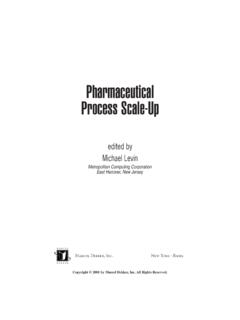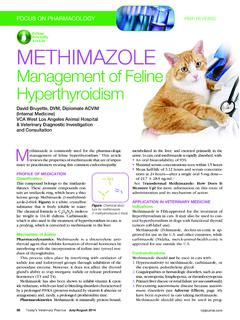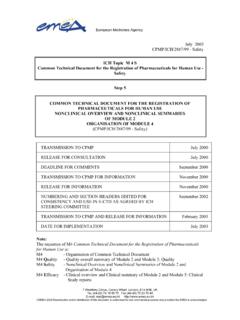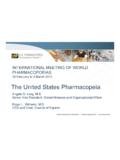Transcription of HIGHLIGHTS OF PRESCRIBING INFORMATION • These …
1 HIGHLIGHTS OF PRESCRIBING INFORMATION These HIGHLIGHTS do not include all the INFORMATION needed to use RECORLEV safely and effectively. See full PRESCRIBING INFORMATION for RECORLEV. RECORLEV (levoketoconazole) tablets, oral Initial Approval: 1981 (ketoconazole) WARNING: HEPATOTOXICITY AND QT PROLONGATION See full PRESCRIBING INFORMATION for complete boxed warning. Cases of hepatotoxicity with fatal outcome or requiring liver transplantation have been reported with oral ketoconazole. Some patients had no obvious risk factors for liver disease. RECORLEV is associated with serious hepatotoxicity. Evaluate liver enzymes prior to and during treatment ( ) RECORLEV is associated with dose-related QT interval prolongation. QT interval prolongation may result in life-threatening ventricular dysrhythmias such as torsades de pointes. Perform ECG prior to and during treatment ( ) -----------------------------INDICATIONS AND USAGE-------------------------- RECORLEV is a cortisol synthesis inhibitor indicated for the treatment of endogenous hypercortisolemia in adult patients with Cushing s syndrome for whom surgery is not an option or has not been curative (1) Limitations of Use RECORLEV is not approved for the treatment of fungal infections (1) ------------------------DOSAGE AND ADMINISTRATION---------------------- Obtain baseline liver and electrocardiogram tests and correct hypokalemia and hypomagnesemia before starting RECORLEV ( ) Initiate dosage at 150 mg orally twice daily, with or without food.
2 Titrate dosage by 150 mg daily, no more frequently than every 2-3 weeks ( ) Maximum recommended dosage is 1200 mg daily, administered as 600 mg twice daily ( ) For additional recommendations on titration and monitoring for efficacy, see Full PRESCRIBING INFORMATION ( ) For recommendations on safety monitoring and dosage modifications for hepatotoxicity, QT prolongation and hypocortisolism, see Full PRESCRIBING INFORMATION ( , ) ---------------------DOSAGE FORMS AND STRENGTHS---------------------- Tablets: 150 mg (3) -------------------------------CONTRAIND ICATIONS------------------------------ Cirrhosis, acute liver disease or poorly controlled chronic liver disease, baseline AST or ALT > 3 times the upper limit of normal, recurrent symptomatic cholelithiasis, a prior history of drug induced liver injury due to ketoconazole or any azole antifungal therapy that required discontinuation of treatment, or extensive metastatic liver disease (4) Taking drugs that cause QT prolongation associated with ventricular arrhythmias, including torsades de pointes (4) Prolonged QTcF interval > 470 msec at baseline, history of torsades de pointes, ventricular tachycardia, ventricular fibrillation, or prolonged QT syndrome (4) Hypersensitivity to levoketoconazole, ketoconazole or any excipient in RECORLEV (4) Taking certain drugs that are sensitive substrates of CYP3A4 or CYP3A4 and P-gp (4)
3 ------------------------WARNINGS AND PRECAUTIONS----------------------- Hypocortisolism: Hypocortisolism has been reported with RECORLEV. Monitor patients for hypocortisolism. Dosage reduction or interruption may be necessary ( ) Hypersensitivity Reactions: Hypersensitivity to RECORLEV has been reported. Anaphylaxis has been reported with oral ketoconazole ( ) Risks Related to Decreased Testosterone: RECORLEV may lower serum testosterone in men and women. Inform patients to report associated symptoms ( ) -------------------------------ADVERSE REACTIONS------------------------------ Most common adverse reactions (incidence > 20%) are nausea/vomiting, hypokalemia, hemorrhage/contusion, systemic hypertension, headache, hepatic injury, abnormal uterine bleeding, erythema, fatigue, abdominal pain/dyspepsia, arthritis, upper respiratory infection, myalgia, arrhythmia, back pain, insomnia/sleep disturbances, and peripheral edema. ( ) To report SUSPECTED ADVERSE REACTIONS, contact Xeris Pharmaceuticals, Inc.
4 At 1-877-937-4737 or FDA at 1-800-FDA-1088 or ------------------------------ drug interactions ---------------------------- --- Consult approved product labeling for drugs that are substrates of CYP3A4, P-gp, OCT2, and MATE prior to initiating RECORLEV ( ) Sensitive CYP3A4 or CYP3A4 and P-gp Substrates: Concomitant use of RECORLEV with These substrates is contraindicated or not recommended ( ) Atorvastatin: Use lowest atorvastatin dose possible and monitor for adverse reactions for dosages exceeding 20 mg daily ( ) Metformin: Monitor glycemia, kidney function, and vitamin B12 and adjust metformin dosage as needed ( ) Strong CYP3A4 Inhibitors or Inducers: Avoid use of These drugs 2 weeks before and during RECORLEV treatment ( ) Gastric Acid Modulators: See Full PRESCRIBING INFORMATION for recommendations regarding concomitant use with RECORLEV ( ) ------------------------USE IN SPECIFIC POPULATIONS----------------------- Lactation: Advise not to breastfeed during treatment and for one day after final dose ( ) See 17 for PATIENT COUNSELING INFORMATION and FDA-approved patient labeling Revised: 12/2021 FULL PRESCRIBING INFORMATION : CONTENTS* WARNING.
5 HEPATOTOXICITY AND QT PROLONGATION 1 INDICATIONS AND USAGE 2 DOSAGE AND ADMINISTRATION Laboratory Testing Prior to RECORLEV Initiation Recommended Dosage, Titration, and Monitoring for Efficacy Monitoring for Safety Dosage Interruptions and Modifications Missed Dose 3 DOSAGE FORMS AND STRENGTHS 4 CONTRAINDICATIONS 5 WARNINGS AND PRECAUTIONS Hepatotoxicity QT Prolongation Hypocortisolism Hypersensitivity Reactions Risks Related to Decreased Testosterone 6 ADVERSE REACTIONS Clinical Trials Experience Postmarketing Experience 7 drug interactions Effects of RECORLEV on Other Drugs Effects of Other Drugs on RECORLEV Alcohol 8 USE IN SPECIFIC POPULATIONS Pregnancy Lactation Females and Males of Reproductive Potential Pediatric Use Geriatric Use Renal Impairment Hepatic Impairment 10 OVERDOSAGE 11 DESCRIPTION 12 CLINICAL PHARMACOLOGY Mechanism of Action Pharmacodynamics Pharmacokinetics 13 NONCLINICAL TOXICOLOGY Carcinogenesis, Mutagenesis.
6 Impairment of Fertility 14 CLINICAL STUDIES 16 HOW SUPPLIED/STORAGE AND HANDLING 17 PATIENT COUNSELING INFORMATION * Sections or subsections omitted from the full PRESCRIBING INFORMATION are not listed. FULL PRESCRIBING INFORMATION WARNING: HEPATOTOXICITY and QT PROLONGATION Hepatotoxicity Cases of hepatotoxicity with a fatal outcome or requiring liver transplantation have been reported with use of oral ketoconazole. Some patients had no obvious risk factors for liver disease. Serious hepatotoxicity has been reported in patients receiving RECORLEV [ see Warnings and Precautions ( ) ]. RECORLEV is contraindicated in patients with cirrhosis, acute liver disease or poorly controlled chronic liver disease, recurrent symptomatic cholelithiasis, a prior history of drug induced liver injury due to ketoconazole or any azole antifungal therapy that required discontinuation of treatment, or extensive metastatic liver disease [see Contraindications (4), Warnings and Precautions ( )].
7 Evaluate liver enzymes prior to and during treatment. Interrupt RECORLEV treatment immediately if signs of hepatotoxicity occur [see Dosage and Administration ( , , ), Warnings and Precautions ( )]. QT Prolongation RECORLEV is associated with dose-related QT interval prolongation. QT interval prolongation may lead to life-threatening ventricular dysrhythmias such as torsades de pointes [see Warnings and Precautions ( )]. Coadministration of RECORLEV with other drugs that prolong the QT interval associated with ventricular arrhythmias, including torsades de pointes, and use in patients with a prolonged QTcF interval of greater than 470 msec at baseline, history of torsades de pointes, ventricular tachycardia, ventricular fibrillation, or long QT syndrome (including first-degree family history) are contraindicated [ see Contraindications (4), drug interactions ( , )]. Perform an ECG and correct hypokalemia and hypomagnesemia prior to and during treatment.
8 Temporarily discontinue RECORLEV if QTcF interval exceeds 500 msec [Dosage and Administration ( , , )]. 1 INDICATIONS AND USAGE RECORLEV is indicated for the treatment of endogenous hypercortisolemia in adult patients with Cushing s syndrome for whom surgery is not an option or has not been curative. Limitations of Use RECORLEV is not approved for the treatment of fungal infections. The safety and effectiveness of RECORLEV for the treatment of fungal infections have not been established. 2 DOSAGE AND ADMINISTRATION Laboratory Testing Prior to RECORLEV Initiation Obtain baseline liver tests [alanine aminotransferase (ALT), aspartate aminotransferase (AST), total bilirubin]. Carefully consider the risks and potential benefits of initiating RECORLEV in patients with AST or ALT above normal but less than or equal to 3 times the upper limit of normal [ see Contraindications (4), Warnings and Precautions ( )]. Obtain baseline electrocardiogram (ECG) [see Contraindications (4), Warnings and Precautions ( )].
9 Correct hypokalemia and hypomagnesemia prior to starting RECORLEV [see Warnings and Precautions ( )]. Recommended Dosage, Titration, and Monitoring for Efficacy Initiate dosage at 150 mg orally twice daily, with or without food [see Clinical Pharmacology ( )]. Titrate the dosage by 150 mg daily, no more frequently than every 2-3 weeks based on 24-hour urine free cortisol levels and patient tolerability [see Dosage and Administration ( )]. Monitor cortisol levels from at least two 24-hour urine free cortisol collections every 2-3 weeks until an adequate clinical response is achieved. The maximum recommended dosage is 1200 mg per day, administered as 600 mg twice daily. The dosage may be reduced to 150 mg once daily if needed for reasons of tolerability [see Dosage and Administration ( , )]. Once the maintenance dosage is achieved, monitor cortisol levels from at least two 24-hour urine free cortisol collections at least every 1-2 months or as indicated.
10 If 24-hour urine free cortisol levels remain above the upper normal limit after treatment with the maximum recommended dosage of 1200 mg per day, or the patient cannot tolerate treatment with RECORLEV, consider discontinuing RECORLEV and switching patient to another therapy. Monitoring for Safety Perform the following monitoring during RECORLEV treatment. Refer to Dosage Interruptions and Modifications below for recommendations pertaining to management of liver, cortisol, or ECG abnormalities [see Dosage and Administration ( )]. Hepatotoxicity Serious hepatotoxicity has been reported in patients receiving RECORLEV, and therefore frequent monitoring of liver tests is recommended. Monitor liver enzymes and bilirubin weekly for at least 6 weeks after starting RECORLEV, every 2 weeks for the next 6 weeks, monthly for the next 3 months, and then as clinically indicated. After any dose interruption or dose increase, monitor on a weekly basis until a stable dosage is achieved [see Warnings and Precautions ( )].




